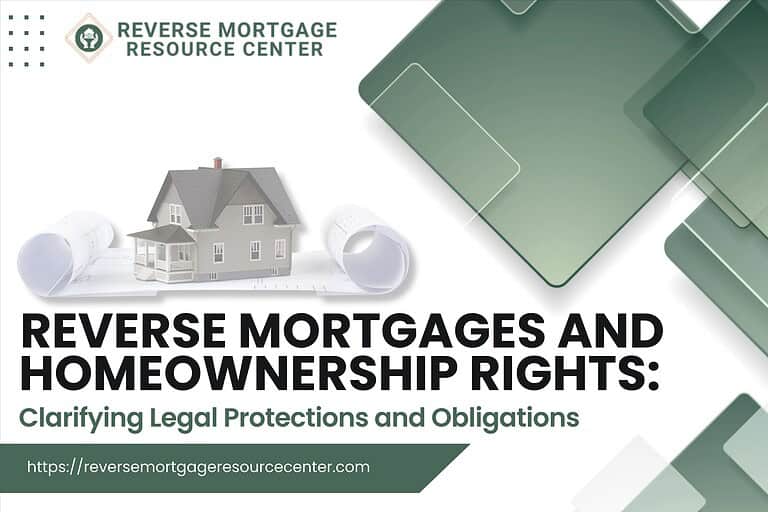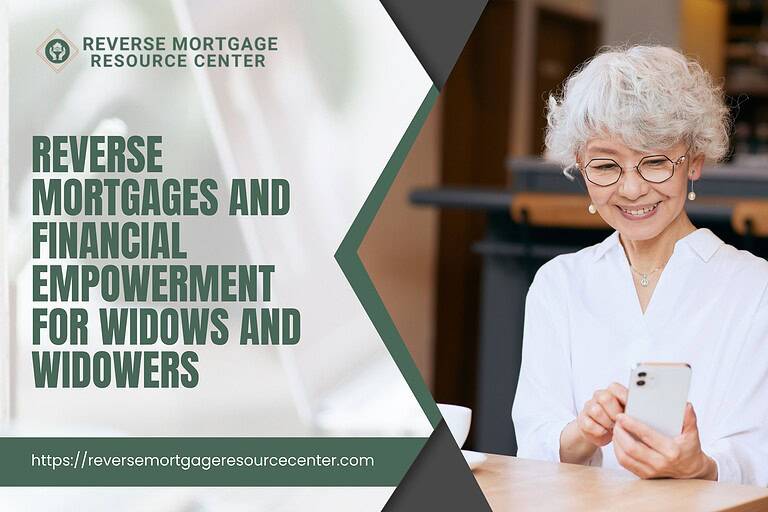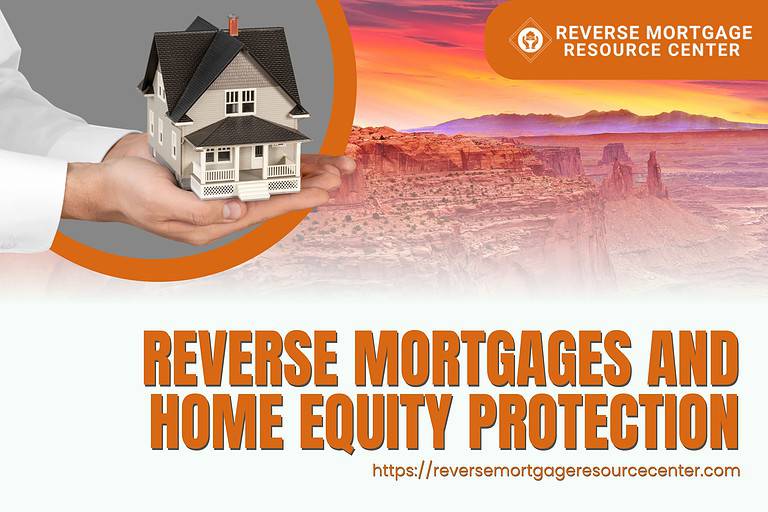What is a reverse mortgage?
A reverse mortgage is a special type of home loan that allows an eligible homeowner to borrow money against the equity in their home. Instead of making monthly payments as you would with a traditional forward mortgage, the lender pays out money to the borrower with a reverse mortgage. The amount received can be received in either a lump sum payment, fixed monthly payment, or line of credit. A reverse mortgage is also called a Home Equity Conversion Mortgage (HECM).
This loan product benefits homeowners who wish to stay in their homes but cannot afford to continue regular mortgage payments. Any accrued interest on the loan is added onto the outstanding balance and does not need to be repaid until the homeowner no longer uses the home as their primary residence, when it’s sold, or when the borrower passes away. Reverse mortgages are designed to help supplement retirement income and can be used to pay off debt, purchase another home, or fund other expenses.
Reverse Mortgage Loans are a unique financial product becoming increasingly popular in the current climate. With rising living expenses, reverse mortgage loans allow seniors to stay secure in their homes and maintain their lifestyles. These loans have become increasingly popular as inflation and cost of living expenses continue to rise, making this a viable option for people looking for peace of mind while allowing them to remain living in their homes.
How does a reverse mortgage work?
A reverse mortgage is a type of loan that works differently than a regular home purchase loan. You don’t have to make any payments on the loan during your lifetime – instead, the lender will pay you! The loan limit, or the amount you can receive, is based on the appraised value of your home and the balance on your existing mortgage. There needs to be sufficient equity in the home to pay off the loan balance.
You can decide how you’d like these payments – as one big chunk, a fixed monthly payment, or a line of credit. The reverse mortgage lender will require that the proceeds from a reverse mortgage will first go to pay off the balance of your existing mortgage. The interest on this loan is added to the balance so you don’t have to pay anything upfront. That means all the money from your payments goes straight into your pocket! This kind of loan allows people to use their home equity to supplement retirement income, pay off debt, buy a new home, or use the loan proceeds in any way they see fit.
What can a reverse mortgage be used for?
A Home Equity Conversion Mortgage (HECM) allows homeowners to access the equity they have built in their homes and utilize it in any way they see fit. The reverse mortgage proceeds provided are not considered taxable income, meaning there is no requirement to pay taxes on the money received from a reverse mortgage. This means that all payments from this loan go straight into the homeowners’ pockets and can be used for a variety of needs, such as paying off debt, remodeling the home to accommodate age-related changes or health needs, supplementing retirement income, providing long-term care and health support, covering healthcare expenses before Medicare eligibility or Social Security income kicks in, and much more. With a HECM, homeowners can make their home equity work for them in ways that were not previously available.
Who is eligible for a reverse mortgage?
To be eligible for a reverse mortgage, there are certain requirements you must meet.
These include:
- You must be at least 62 years old
- Own your home outright or have at least 50% equity
- Live in the home you’re financing for most of the year
- Not be delinquent on any federal debt, such as student loans or income taxes
- Prove you can pay property taxes and homeowners insurance premiums
- Maintain your home in good condition, or use reverse mortgage funds for necessary repairs
- Get counseling from a HUD-approved reverse mortgage counselor
Working with a Reverse Mortgage Specialist can help you understand these requirements and see if you qualify for a Reverse Mortage.
How much money can you get from a reverse mortgage?
The amount of money you can receive from your reverse mortgage loan will depend on several factors. Your mortgage specialist will be able to review your options with you. The following information will be required to get you an accurate estimate of your loan options.
- Your age
- Type of property you own (single-family, townhome, condo or multifamily, or manufactured home)
- Your home’s value
- Your current mortgage balance (if any)
- Whether the home is your primary residence
- Your home’s ZIP code
To calculate the terms and HECM loan options, it’s best to work with reverse mortgage loan officers with specific loan calculator software to process the calculations.
How much does a reverse mortgage cost?
Just like any mortgage, there are fees associated with every reverse mortgage. These fees will include lender fees, title fees, appraisal fees, and any other necessary 3rd party fees to complete your reverse mortgage loan. You will also have upfront mortgage insurance and mortgage insurance premiums.
Types of reverse mortgages
The two most popular types of reverse mortgages are the Home Equity Conversion Mortgage (HECM) and the Proprietary Reverse Mortgage.
Home Equity Conversion Mortgage (HECM): The HECM is insured by the Federal Housing Administration (FHA) and is offered through an FHA-approved lender. This type of loan has a fixed interest rate, and you can choose to receive your money as a lump sum, a line of credit, monthly payments, or any combination of these. A HECM reverse mortgage is the most common reverse mortgage.
Proprietary Reverse Mortgage: A proprietary reverse mortgage is a private loan that is backed by the company that created it. Typically, this loan will have higher borrowing limits than an HECM and may also be used to purchase a home. These loans usually have adjustable interest rates.
If you’re considering a reverse mortgage, it’s important to understand the details and options available to make sure you choose the right loan for your situation. A Reverse Mortgage Specialist can help guide you through this process. Their knowledge and expertise will ensure you get the best loan for your needs and that all your questions are answered.
Alternatives to a reverse mortgage
HELOC – Home Equity Line of Credit
An alternative to a reverse mortgage could be a home equity loan or home equity line of credit. These loans may offer a cheaper way to borrow against your equity, although they come with risks and usually require monthly payments. Qualifying for these loans will depend on your income and credit score.
Refinancing
Refinancing with a traditional conventional loan might also be an option, depending on interest rates. Replacing your current mortgage with a traditional loan could reduce monthly payments, but you should consider the time required to repay the loan, as it can alter your retirement plans. A shorter-term loan, such as a 10-year or 15-year loan term, may be best, depending on your monthly budget and if you’re close to retiring.
Downsizing
Downsizing is a great option for those looking to reduce their overall expenses. Selling your home and moving to a more cost-effective residence can help offset the cost of living, allowing you to enjoy your retirement years without worrying about finances. Downsizing also frees up equity that can be used for other purposes, such as education, travel, or investments. Additionally, the smaller mortgage payments associated with a smaller home can help maintain financial stability and peace of mind. Downsizing is not only an effective way to reduce expenses but also a great way to simplify life during retirement.
Lowering your Expenses
Lowering your expenses can be a great way to reduce the financial burden during retirement. There are numerous state and local programs that can help with utilities, fuel payments, property taxes, home repairs, and more. Researching these programs can give you an idea of which ones may apply to your situation so that you can take advantage of any available assistance. Lowering your expenses can also help you adequately budget for retirement, allowing you to enjoy the lifestyle you want without worry. Additionally, lowering your expenses can help keep more money in your pocket and give you more financial flexibility.
Reverse Mortgage Pros and Cons
Before deciding to get a reverse mortgage, it’s important to understand the pros and cons. Evaluating both sides of the equation will help you make an informed decision that best suits your needs and financial situation. Consider all available options and weigh the benefits against the potential risks before signing any paperwork. With proper research and advice from professionals in the field, you can make the best decision possible for your retirement years.
The pros of a reverse mortgage include:
- You can remain in your home as long as you continue to live there with no monthly mortgage payment
- You retain the title of your home
- You will have more options for taping your equity than regular forward mortgages.
- You can access the equity in your home at any time
- The loan does not have to be repaid until you die, sell your home, or no longer use it as your primary residence.
- You can supplement your retirement income and leave other retirement accounts untouched.
- You can pay off debt or have a rainy day fund for unexpected medical expenses.
- You won’t face taxation on the money you receive from a reverse mortgage.
- Your heirs will not be burdened with an underwater home.
The cons of a reverse mortgage include:
- You may have to pay fees and closing costs.
- If you take out a reverse mortgage and then move, you may have to pay the loan back immediately.
- The interest on a reverse mortgage can be higher than on a traditional mortgage.
- Your home’s equity may be reduced every month.
- You may disqualify yourself from other income benefits.
- Your heirs will inherit less of your assets because you use them for your benefit.
- You won’t get a tax deduction on the reverse mortgage interest that is not paid.
- There is no guarantee that the equity in your home will be enough to cover the loan amount when you pay off the reverse mortgage.
Reverse mortgages can be a great way to supplement retirement income and stay in your home. However, they also come with some risks that should be carefully considered before taking out such a loan. It is important to research all available options and speak to experts who know about reverse mortgages before deciding. Doing so can help ensure that you make the best choice for your financial situation.
Reverse mortgage requirements
- Property Type
- Age, Equity, and Fees
- Collateral Protection
- Reverse Mortgage Counselling
- Understand the terms of a reverse mortgage
Is a reverse mortgage a good option for you?
It is important to consider whether a reverse mortgage is right for you and your situation before making any decisions. Risks are associated with this type of loan, so weighing all the pros and cons is important before deciding if this is an appropriate option. Be sure to consult with a qualified financial professional to get the best advice for your situation.
Additionally, it is important to research all the different reverse mortgage options available to ensure that you find the best one for your needs. Reverse mortgages can be a great way to tap into your home equity without selling or refinancing your home, but they are not right for everyone. Make sure you understand all the risks and ask any questions before signing on the dotted line.
Here are a few thoughts on who may or may not be a good fit for a reverse mortgage.
A reverse mortgage may be a beneficial choice if:
- You have no current mortgage or a very low loan balance on your mortgage.
- You don’t want to manage the responsibility of making monthly loan payments.
- Your retirement income is insufficient for a regular mortgage or home equity loan.
- You are lagging in retirement savings.
- Your current income is not enough for a standard mortgage.
- You don’t want to sell the home.
- You plan on staying in your home.
A reverse mortgage may not be suitable if:
- You anticipate moving out of your residence.
- Your finances are strained.
- The maintenance costs of your home are beyond your means.
- House prices in your region have been decreasing.
- Interest rates are increasing.
- You feel pressured by someone to get a reverse mortgage loan.
How to Apply for a Reverse Mortgage
Contact the loan specialists at the Reverse Mortgage Resource Center to schedule your free consultation. We will discuss your individual needs, review the reverse mortgage requirements, and help you determine if a reverse mortgage is right for you.
We believe in honoring you and your financial decisions at the Reverse Mortgage Resource Center. You will never get a high-pressure sales pitch or a recommendation for a loan that is not suitable for you. Our call will answer your questions and see if you qualify for a reverse mortgage. Call us today.
REVERSE MORTGAGE RESOURCE CENTER ~LIVE LIFE ON YOUR TERMS~
Our Lending Team has been serving our clients since 2004. We are passionate about serving our clients with integrity to help them achieve their financial goals.



